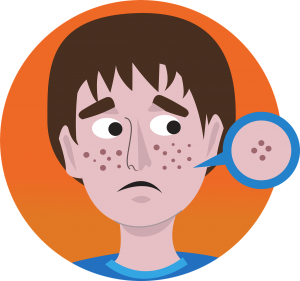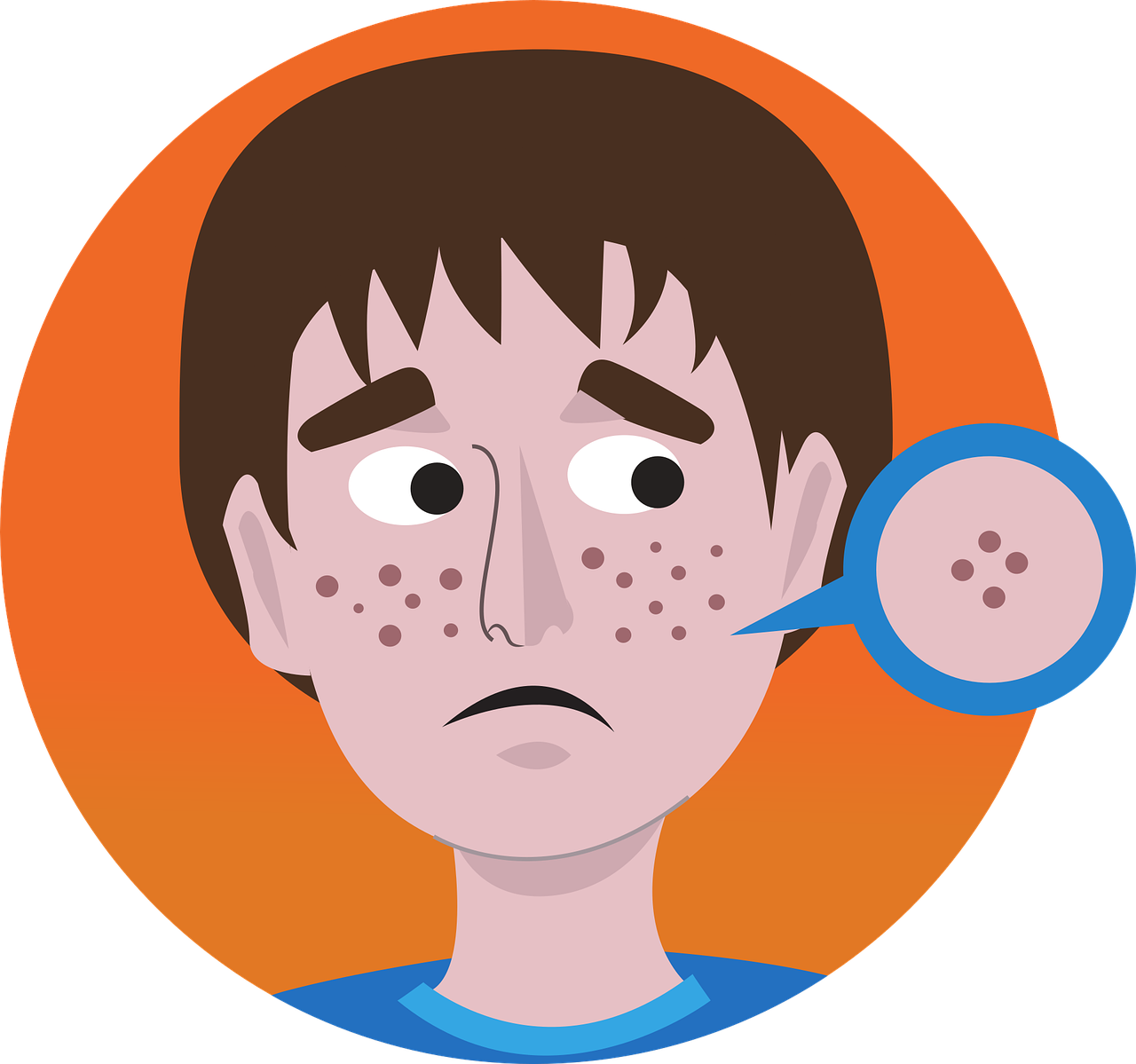
Did you know that acne is the most common skin condition in the United States, affecting
up to 50 million Americans annually?
Living with Acne can be tough.
It is probably one of the toughest skin types to care for.
Acne prone skin requires you to go an extra mile when it comes to your skincare or even
makeup routine.
There are a lot of myths surrounding acne and what causes it.
But one thing’s for sure, nobody wants to have it on their faces.
Acne affects adolescents and adults alike and it can be as physically painful as it
is emotionally embarrassing.
So what really causes Acne?
Well, keep reading today’s article because we will be telling you the real reasons you
keep getting acne.
From pollution, eating certain foods, overwashing your face, sweat to smoking and more, read
till the end to know about all of them.
Not Enough Omega-3 in your Diet:
You may be wondering what sardines and anchovies have
to do with pimples.
Research shows that inflammatory chemicals cause the production of sebum to increase.
It is like going through puberty when your sebaceous glands, once again, go into overdrive.
Omega-3 is known to prevent inflammatory chemicals from making your sebaceous glands hyperactive.
With less sebum, you can expect little to no acne appearing on your skin.
Too Much Exposure to the Sun:
This happens over a period of time, like a little over
half a decade of exposure to the sun.
When your skin has been exposed for long hours under the sun over a spread of several years,
your skin eventually adapts by producing more oil.
More oil means clogged pores.
When your pores get clogged, the cellular walls break down inviting bacterial growth,
which then results in acne.
Enjoying this list so far?
Hormones:
Thanks to the hormone fluctuations of menstruation, many women notice acne flare-ups
on or around their period.
Generally, pimples occur when dead skin and sebum which is an oily substance produced
by the sebaceous glands get together to block your pores or hair follicles.
If you suffer from hormonal acne, you likely get breakouts along your chin and jawline
during ovulation which is usually 14 to 20 days into your cycle.
That’s typically when progesterone spikes, stimulating sebum production.
Hormonal acne can also pop up during pregnancy or after going off birth control.
Sweat:
We’re not saying you shouldn’t sweat.
The act of sweating doesn’t directly cause acne.
However, sitting in damp, dirty workout clothes, or not showering or washing your face directly
after a hard sweat, leaves your skin susceptible to bacteria.
To help guard against breakouts, especially on the neck, back, and chest, wear ventilated
or moisture-wicking workout clothes.
You should also dab your face with a clean towel during workouts, and shower immediately
after sweat sessions.
Over Washing Your Face:
Want to zit proof your skin?
Don’t wash your face more than twice a day, unless you really need to.
Use a daily mild, non comedogenic face wash and oil free moisturizer.
Resist the temptation to scrub with acne-busting cleansers everyday.
Use an acne wash only a few times a week to prevent your skin from dehydrating as this
could trigger more oil secretion and pimples.
If necessary, apply a 2 percent salicylic acid spot treatment to the pimple and don’t
forget to exfoliate two or three nights a week with an AHA product.
You can use glycolic acid pads to remove dead skin, refine texture, and help unclog pores.
Smoking:
Research indicates that smoking exacerbates acne by causing oxidative stress to skin and
altering sebum composition.
A study carried out on 1,000 women also revealed that the proportion of acne sufferers was
significantly higher among smokers, about.
40 percent than among non-smokers which was about 10 percent.
Dirty Bed:
Believe it or not, acne can happen while you sleep.
Over time, bacteria and dirt build up on your bedding and can seep into your pores while
you snooze.
If you want to prevent the unwelcome morning surprise of a fresh breakout, make sure to
wash your bedding at least once per week.
Still repelled by the thought of leaving bacteria and dirt in your bed every night?
Make sure you always cleanse your face before bed.
You can also try switching your daily shower routine to the evening.
Blocked Pores:
Your skin is covered in tiny holes, called pores, which allow it to breathe.
These pores contain oil glands beneath the skin that produce oil to moisten the hair
and skin.
This oil is not always a bad thing.
Usually the glands produce an adequate amount of oil that maintains your skin’s young,
fresh and healthy glow.
However, when these glands come into contact with a hormone called DHT, they produce excess
oil that plugs pores, causing the glands to generate even more oil and swell.
White blood cells then attack the bacteria, causing acne.
This acne formation process can generally begin weeks before blemishes even become visible.
Diet:
Chances are, you’ve heard somewhere, or from someone, that certain foods cause
acne.
And there are even certain food groups that get a lot of hate for this reason.
Let’s cut to the chase, does dairy cause acne?
The answer is yes, depending on the type of dairy.
Several studies have linked whole, low-fat, and skim milk to increased acne breakouts.
That being said, there has been no evidence that products made from milk, such as cheese
or yogurt, cause increased breakouts.
If you have a sweet tooth, you may be left wondering, Does chocolate cause acne?
Well, further research needs to be done to prove a correlation between eating chocolate
and increased breakouts.
However, people typically eat chocolate when stressed, which could actually be the cause
of unwanted acne.
Although it is advisable to stay away from heavily salted food, refined sugars and foods
high in saturated fats.
Stress:
We’ve all been there, you’re going through an incredibly difficult week at work
and then, bam, an angry Zit shows up to make things even worse.
While the correlation has long been suspected, researchers are just now starting to study
the link between stress and acne.
In a study, researchers used an acne grading system and a self-reported stress test to
analyze the link between the two.
They found that women who had higher stress scores experienced significantly worse acne
lesions.
You can once again blame hormones for this one.
Stress leads to a surge in hormones that promote oil production, such as cortisol and androgens.
This, in turn, blocks the pores promoting breakouts.
Makeup Products:
Dealing with acne can be a bit of a confidence killer, and it’s only
natural to want to cover it up.
But packing on the foundation, concealer, and powder may be the reason your skin is
freaking out in the first place.
Acne caused by makeup will often take the form of tiny bumps or whiteheads along your
cheeks, chin, or forehead.
The kicker?
There often isn’t just one culprit.
Products that contain pore-clogging oils or drying alcohol, sleeping in your makeup, and
using dirty makeup brushes can all spur pesky pimples.
Letting your skin breathe can help, but you don’t have to go bare-faced 24/7 to clear
up acne caused by makeup–you just have to choose your products carefully and be extra-hygienic
when putting it on and taking it off.
Pollution:
Think about it, If pollution can kick dirt up into the air, imagine what it
may be doing to your skin?
Research shows that people who live in areas with high air pollution, such as big cities,
may experience worse acne.
That’s because these various particles can crank up inflammation and oil production in
your skin, spurring clogged pores that eventually develop into pimples.
The best way to prevent pollutants from aggravating your skin is to keep them out.
Try to form a protective barrier against pollution by applying a moisturizer and a broad-spectrum
sunscreen daily.
Your Cellphone:
You can touch your phone over 2,000 times a day.
Bacteria and dirt from your fingers can build up on your screen, causing breakouts around
your chin, cheeks, and mouth.
To keep your screen clear, give your phone a daily rubdown with an antibacterial wipe.
Or you can switch to making calls using headphones to avoid contact with your phone at all.
Weak Immune System:
Your immune system is incredibly important when it comes to keeping
your body safe and protected from pathogens, germs and bacteria.
If your immune system is under stress, it can trigger an inflammatory reaction which
can then exaggerate your acne symptoms.
For example, when propionibacterium, the bacteria responsible for acne, starts to starve, it
will release chemicals that agitate the immune system, prompting an inflammatory response.
However, if your immune system is fatigued or over-stimulated, it might release too many
inflammatory chemicals that can start to target healthy skin cells as well as the bacteria,
leading to an outbreak of acne.
Poor Digestion:
Your digestion is another factor to consider when discussing the causes
of acne.
Poor bowel function can often be caused by aspects of your lifestyle, such as your diet
and your stress levels.
If you are not moving your bowels regularly, then you will not be expelling all the waste
products from your food.
This can then cause toxins to linger in your system and eventually provoke a reaction from
your immune system and skin cells resulting in a breakout of acne.
Is your skin acne prone?
Have you been able to figure out the reason for your acne?
Let us know in the comments section below!







